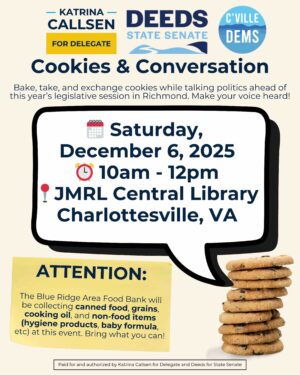 Come chat with Sen. Creigh Deeds and Del. Katrina Callsen on Saturday, Dec. 6, for “Cookies and Conversation” from 10am to noon in the Swanson Room of the downtown Jefferson-Madison Regional Library. Bring your questions – and cookies for a holiday exchange (don’t forget an empty container!) – and to enjoy a relaxed conversation with your representatives!
Come chat with Sen. Creigh Deeds and Del. Katrina Callsen on Saturday, Dec. 6, for “Cookies and Conversation” from 10am to noon in the Swanson Room of the downtown Jefferson-Madison Regional Library. Bring your questions – and cookies for a holiday exchange (don’t forget an empty container!) – and to enjoy a relaxed conversation with your representatives!
If you missed our food and toiletries drive last month, feel free to bring donations on Saturday; Katrina and Creigh will take anything collected to the Blue Ridge Area Food Bank.


 If you’re angry, frightened, fed up, and want to get politicians’ attention, NY Rep. Alexandria Ocasio-Cortez (aka AOC) emphasizes the effectiveness of phone calls to your congressional representatives, no matter which side of the aisle. From her
If you’re angry, frightened, fed up, and want to get politicians’ attention, NY Rep. Alexandria Ocasio-Cortez (aka AOC) emphasizes the effectiveness of phone calls to your congressional representatives, no matter which side of the aisle. From her 
